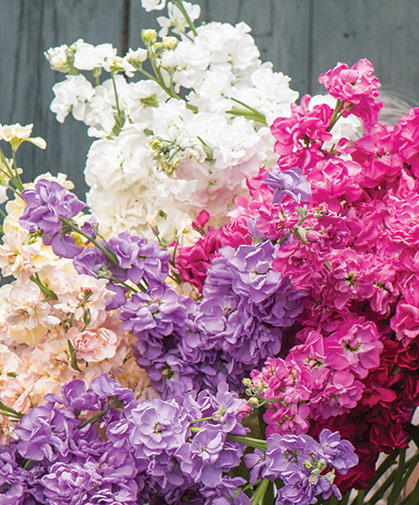Stock - Key Growing Information
DAYS TO GERMINATION:
7-14 days at 65-75°F (18-24°C)SOWING:
Transplant (recommended) - Sow ¼" deep into 128-cell plug flats 5-6 weeks before transplanting out into the field or protected structure. Direct seed - After danger of frost. Do not pinch plants. Succession-plant every two weeks for multiple harvests. Stock is a cool-weather crop. Spring and fall-blooming successions are optimal. Stock is a member of the brassica plant family and is susceptible to flea beetle predation. To prevent flea beetle damage, cover plants with row cover at the time of transplanting. SELECTION: Selection for double-flowering plants is a difficult and time-consuming process. For most situations, we recommend finding a use for the single-flowering plants rather than conducting selection. Chilling seedlings causes visual differences that allow you to select for double-flowered plants by observing color, size, and shape of the cotyledon. While in the cotyledon stage, expose the seedlings to temperatures of 40-45°F (4-7°C) for 3-4 days. Select lighter green seedlings with an oval shape; these will produce double flowers. Discard very small seedlings, ones that are darker green in color, and those with rounder shaped cotyledons; these will produce single flowers. See our Stock Production Guide #8227 for more details and information on selection.LIGHT PREFERENCE:
Sun.PLANT HEIGHT:
Varies.PLANT SPACING:
4-6" trellis, such as Hortonova, used as horizontal support, is necessary when the temperatures are consistently above 60°F (16°C) or where it rains frequently.HARDINESS ZONES:
Annual.STEM LENGTH:
24-28".VASE LIFE:
5-10 days.STORAGE TEMPERATURE:
36-41°F (2-5°C).HARVEST:
Fresh - Harvest when ⅓–½ the florets on the stem are open.SOIL REQUIREMENTS:
Well-drained, moderately rich soil.USES:
Excellent fragrant cut flower. Edible flower. Can be used for beds, borders, and containers, though bloom window is brief, especially in hot weather.SCIENTIFIC NAME:
Matthiola incana


